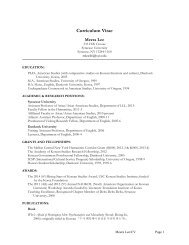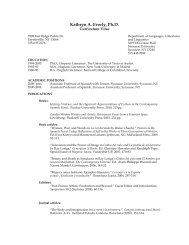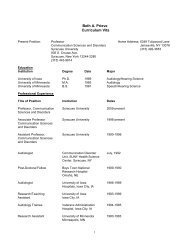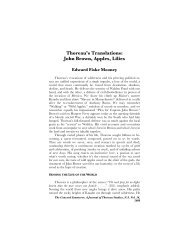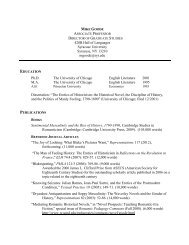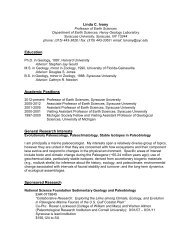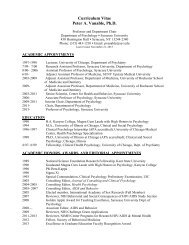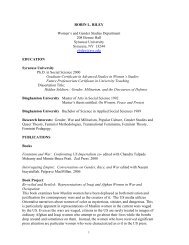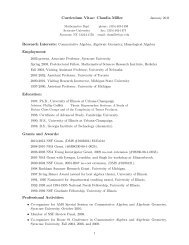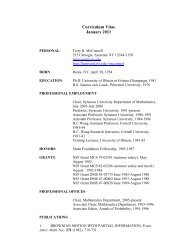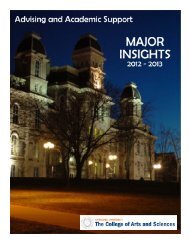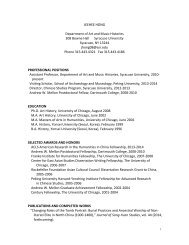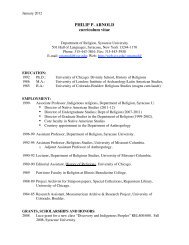Hannay's review of On Soren Kierkegaard
Hannay's review of On Soren Kierkegaard
Hannay's review of On Soren Kierkegaard
Create successful ePaper yourself
Turn your PDF publications into a flip-book with our unique Google optimized e-Paper software.
4knowledge that we need, but a Kantian realization <strong>of</strong> the limits <strong>of</strong> what can beknown, yet with a sense <strong>of</strong> there being something more.Several other readings <strong>of</strong> Climacian humor are put aside, among them the popularanalogy with Wittgenstein's disposable ladder. (Yet it is remarkable how closely theTractatus wording follows Climacus.) Mooney sets up two extreme readings <strong>of</strong> therevocation. <strong>On</strong>e is <strong>of</strong> flawed character (failure <strong>of</strong> nerve or commitment,<strong>Kierkegaard</strong>'s own, presumably, rather than Climacus's) and the other that <strong>of</strong> a'gracious, and even self-sacrificial gesture' in which, the play now over (p. 217),<strong>Kierkegaard</strong> (or just Climacus?) leaves the stage altogether. Mooney gives theformer alternative a wide berth, but he steers clear <strong>of</strong> the latter too, with its postmodern,all-takers implications. There has to be some living truth in these works ifthey are to animate the reader in the direction <strong>of</strong> selfhood.Mooney's concluding chapter is about silence. Some works directly invite silencewhile others loquaciously home in upon it. The early discourses, lacking any veneer<strong>of</strong> wit and irony, are intended to 'cultivate, form, or animate a soul without regardto the reader's status' (p. 227). Here there is no test for our intellects. It is asthough Mooney were saying that they speak to us each in the silence <strong>of</strong> our ownchurch, the test <strong>of</strong> our qualifications to appreciate them being our ability to provideourselves with that kind <strong>of</strong> silent and receptive space, a space where what we aregives way (less easy in a real church) to a simple awareness that we are -- that'alluring and repelling mystery <strong>of</strong> existence' (p. 242).What <strong>of</strong> the later discourses, those that are properly discursive? (The earlydiscourses [Taler] may be better labeled 'talks', as the Danish permits.) I readMooney as saying that they deliver a form <strong>of</strong> understanding best acquired insilence, which seems plausible. But then, when we come to the pseudonyms, wealso have a work so plainly and 'loquaciously' discursive, as well as witty and ironic,as Postscript. Of this Mooney says that its 'dialectical acrobatics' serve partly toundermine the 'allure' (p. 239) <strong>of</strong> its own form <strong>of</strong> loquacity. And <strong>of</strong> course, as thiswork is all the time loquaciously saying, its question (how to become a Christian)can only properly occur in a mood <strong>of</strong> responsiveness, to which the work would haveus return once we have read it, just as the answer must be a practical one thatdevelops out <strong>of</strong> that mood.The heads <strong>of</strong> those who have actually been brought to silence by Postscript <strong>of</strong>course cannot be counted. What is certain is that this work, like others, has broughtupon itself a more than fair share <strong>of</strong> loquacity. Many <strong>of</strong> us are guilty <strong>of</strong> this as wellas Mooney, <strong>of</strong> course. But here we must not complain. This is not yet anotherattempt to accommodate <strong>Kierkegaard</strong> to the concepts and categories <strong>of</strong> currentphilosophical theorizing. It is a result (in Mooney's prefatory words) <strong>of</strong> a 'wrestling'with <strong>Kierkegaard</strong>'s themes, and his 'grappling' with the way in which it seemsfigures <strong>of</strong> great worth 'so <strong>of</strong>ten seem to be responding to a call to be who they will



